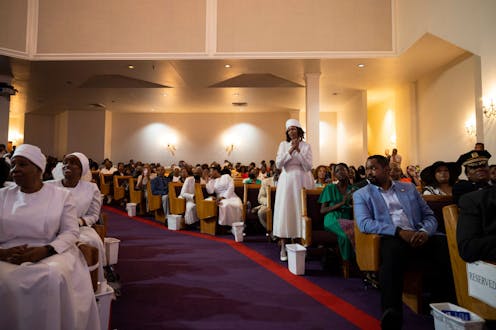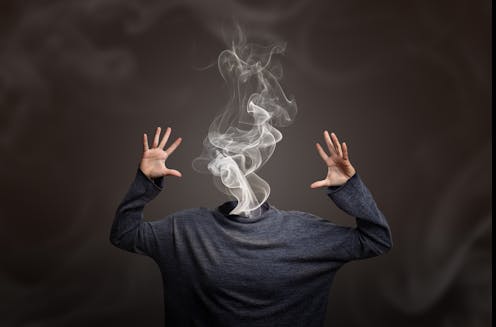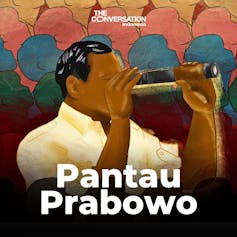Black Pentecostal and charismatic Christians are boosting their visibility in politics − a shift from the past
- Written by Dara Delgado, Assistant Professor of Religious Studies and Black Studies, Allegheny College

Many Black leaders are swinging into action[1] for the Harris-Walz campaign – and clergy are no exception[2].
On Aug. 5, 2024, The Black Church PAC hosted a “Win With the Black Church” webinar[3] to register voters, sign up volunteers and raise funds for Vice President Kamala Harris. The kickoff event, which organizers said raised US$500,000 and boasted 16,000 attendees, was hosted by the political action committee’s co-founder, Mike McBride – pastor of The Way Christian Center in California.
Apart from politics, McBride shares something else with many of the people on the webinar, including gospel singer Erica Campbell, pastor Jamal Bryant and co-founder the Rev. Leah Daughtry: All draw on Pentecostal faith.
As a scholar of American Pentecostalism and Black Studies[4], I see this event as but one example of Black Pentecostal and charismatics’ increasing visibility in American politics – a notable shift from the past.
Power of the Holy Spirit
Pentecostalism is a global Protestant Christian movement[5]. As an evangelical Christian tradition, Pentecostalism emphasizes salvation through Jesus Christ and the centrality of scripture. It differs, however, in its understanding of the Holy Spirit: how God’s energy and essence work in the world.
Across most denominations and traditions, Christians believe in the Holy Spirit – part of the Holy Trinity, together with God the Father and Jesus Christ, the Son.
Pentecostalism is distinct, however, because its adherents claim that they directly experience the active presence of the Holy Spirit in their lives, through spiritual gifts such as healing, prophecy and speaking in tongues – a spiritual experience consisting of a series of unintelligible speech-like utterances and sounds. Pentecostals believe that speaking in tongues, or “glossolalia,” is a divine language[6] and an essential means for communicating with God.
Pentecostals draw inspiration from the Book of Acts, part of the Bible that describes the founding of the early church after Jesus’ death. Chapter 2 depicts an event called the Pentecost[8], when disciples of Jesus were gathered together. Scripture describes them suddenly “filled with the Holy Spirit and (beginning) to speak in other tongues,” yet onlookers heard their own language spoken. In this moment, Pentecostals believe that the power of the Holy Spirit was poured out on Christ’s followers – and that it has been accessible ever since.
Because Pentecostals maintain that this type of spiritual activity continues today, they also emphasize speaking in tongues as evidence that someone experienced the baptism of the Holy Spirit[9]. Glossolalia is seen as a critical entryway to the faith and to personally experiencing the Holy Spirit in your life.
Apart from Pentecostal churches, Christians called “charismatics” have similar beliefs about the dynamic activity of the Holy Spirit in their lives. Charismatic Christians, however, are affiliated with other denominations, from Catholicism[10] to mainline Protestant churches.
Black Pentecostal tradition
Within the global Pentecostal and charismatic landscape, Black American churches form a distinct tradition[11].
In June 2024, with support from the Public Religion Research Institute, PRRI fellows Youssef Chouhoud[12], Flavio Rigerio Hickel[13] and Leah Payne[14] and I conducted a survey of 2,418 adults in the United States. Half of the 734 Black respondents identified as Pentecostal or charismatic. Similarly, in 2021, Pew Research Center[15] reported that “half of all Black churchgoers say services include speaking in tongues.”
Scholars of American Pentecostalism maintain that from its inception, the movement was indebted to the religious practices of enslaved Black Christians[16]. Black Pentecostal churches and organizations formed in the early 20th century as a result of racism. In 1914, for example, the white founders of the Assemblies of God, USA decided to disaffiliate[17] from the predominantly Black Church of God in Christ.
Black Pentecostalism teaches that Christians have an obligation to do good in the world. Social engagement has been essential to many Black Pentecostal identities and congregational life since their beginnings, especially material works of mercy – feeding the hungry, clothing the naked and educating the ignorant.
Eyes toward heaven
Such commitments were a stark contrast to Black Pentecostals’ civic life and political involvement.
Although there have been Pentecostals associated with politics and community activism[19], the tradition does “not possess an explicit political theology[20],” as Pentecostal theologian Steven M. Studebaker[21] observes. Black Pentecostal traditions especially have often oriented themselves away from this world’s sociopolitical affairs, toward concerns about personal and social morality[22] and hope of heaven.
In fact, for generations, American Pentecostals broadly prided themselves on being intentionally apolitical. Black churches and leaders were key to mobilizing the Civil Rights Movement, for example, but Pentecostals believed that their most important contribution was through prayer[23], as historian Jonathan Chism[24] notes.
Moreover, Black Pentecostals’ absence from politics reflects a history of discrimination and condescension from other Black Americans, including Black mainline Christians[25]. During the early to mid-20th century, Black Pentecostals were often seen as lower class[26], unlike other Protestant groups[27] such as Black Baptists and Methodists.
Critics feared the emotionality of their religious expression and their tendency toward gender inclusivity[28], which they worried would make Pentecostals a liability in the push for Black Americans’ rights. Black Pentecostals were not trusted with representing Black social and political interests in the public square.
Recent shift
Since becoming the Democratic nominee, Harris has garnered a wellspring of support from Black faith leaders[29], including influential Black preachers who either remain in or came up in the Pentecostal or charismatic congregations. Among them are Traci Blackmon[30], Chrisette Ellis[31] and Gabby Cudjoe Wilkes[32].
Trump has enjoyed endorsements from a smaller number of Black Pentecostal leaders, but without the same celebrity status[33] as the Black Pentecostal or charismatic preachers backing Harris. Take for example Darrell Scott[34], a pastor from Ohio, who remains firm in his support[35]. Harry R. Jackson[36], a prominent Black pastor in conservative circles who died in 2020, was a religious adviser to the former president. Most recently, Lorenzo Sewell, the pastor of 180 Church[37] in Detroit, addressed the Republican National Convention[38].
On both sides, these developments mark a noticeable shift among Black Pentecostals from private prayers or local social engagement to visible political involvement. This is also true for some of their conservative evangelical counterparts, especially Black Baptists affiliated with the Southern Baptist Convention[40], who are leaving that denomination over differences in social and political issues, especially around race.
In the same 2021 report[41], Pew highlighted the political tensions embedded in race and religion for Black Christians in the United States. Only 10% of Black Americans lean toward the Republican Party, but that percentage doubles for Black Protestants who attend a mostly white church. Still, what this data helps show is that for the majority of Black Christians, their political views are more reflective of their experiences with race than their congregational affiliation.
Contemporary Black Pentecostals and charismatics are turning the page on their history of political apathy – whether through public endorsements[42], voter registration drives or as part of groups such as the Black Church PAC. Churches have long been a pillar of how Black Americans “hold and build political power in this country,” as McBride told Religion News Service[43]. Pentecostals are working to keep that legacy alive – and expand the proverbial walls of the Black church.
References
- ^ swinging into action (www.forbes.com)
- ^ clergy are no exception (www.christianitytoday.com)
- ^ a “Win With the Black Church” webinar (religionnews.com)
- ^ a scholar of American Pentecostalism and Black Studies (sites.allegheny.edu)
- ^ a global Protestant Christian movement (www.cambridge.org)
- ^ is a divine language (doi.org)
- ^ Joe Raedle/Getty Images (www.gettyimages.com)
- ^ an event called the Pentecost (web.mit.edu)
- ^ the baptism of the Holy Spirit (doi.org)
- ^ from Catholicism (doi.org)
- ^ form a distinct tradition (www.ivpress.com)
- ^ Youssef Chouhoud (cnu.edu)
- ^ Flavio Rigerio Hickel (www.washcoll.edu)
- ^ Leah Payne (www.drleahpayne.com)
- ^ Pew Research Center (www.pewresearch.org)
- ^ indebted to the religious practices of enslaved Black Christians (www.ivpress.com)
- ^ decided to disaffiliate (www.eerdmans.com)
- ^ Wikimedia Commons (commons.wikimedia.org)
- ^ and community activism (www.brazierfoundation.org)
- ^ not possess an explicit political theology (doi.org)
- ^ Steven M. Studebaker (www.multnomah.edu)
- ^ concerns about personal and social morality (search.worldcat.org)
- ^ through prayer (rowman.com)
- ^ historian Jonathan Chism (www.uhd.edu)
- ^ from other Black Americans, including Black mainline Christians (yalebooks.yale.edu)
- ^ were often seen as lower class (archive.org)
- ^ unlike other Protestant groups (www.uapress.com)
- ^ gender inclusivity (www.degruyter.com)
- ^ Black faith leaders (wordinblack.com)
- ^ Traci Blackmon (www.stlamerican.com)
- ^ Chrisette Ellis (www.instagram.com)
- ^ Gabby Cudjoe Wilkes (www.yahoo.com)
- ^ celebrity status (www.washingtonpost.com)
- ^ Darrell Scott (politicaltheology.com)
- ^ remains firm in his support (www.theguardian.com)
- ^ Harry R. Jackson (religionnews.com)
- ^ 180 Church (180church.cc)
- ^ Republican National Convention (youtu.be)
- ^ AP Photo/Matt Rourke (newsroom.ap.org)
- ^ Southern Baptist Convention (www.nytimes.com)
- ^ In the same 2021 report (www.pewresearch.org)
- ^ public endorsements (www.tiktok.com)
- ^ told Religion News Service (religionnews.com)
Authors: Dara Delgado, Assistant Professor of Religious Studies and Black Studies, Allegheny College



